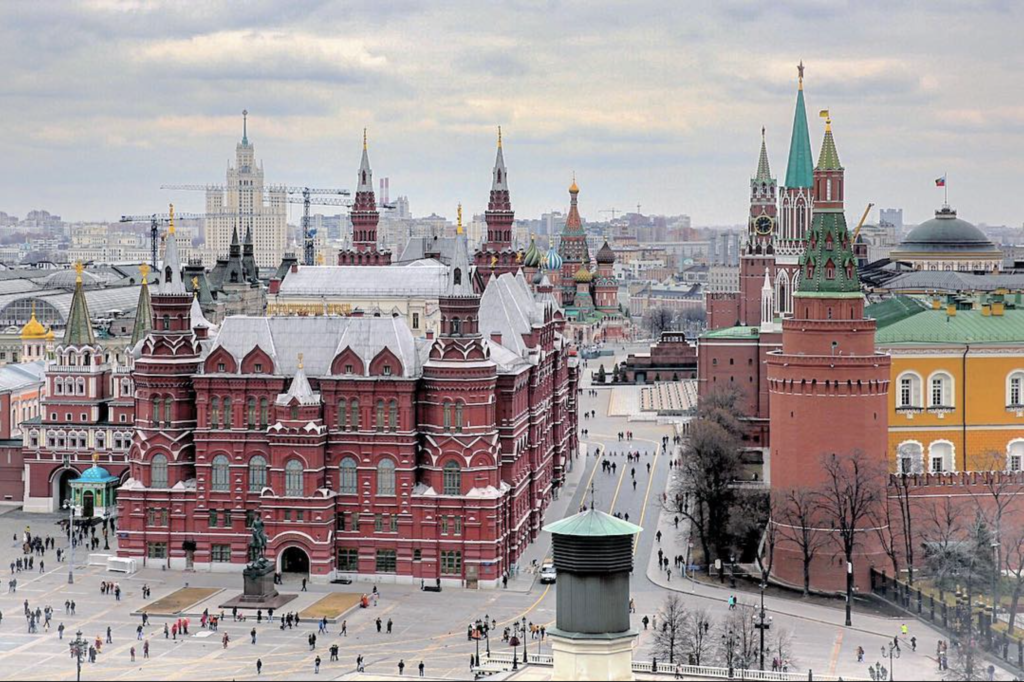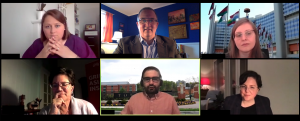
The Kremlin, Moscow. Source: U.S. Department of State
ARTICLES
Info Wars: Russia is Already at War with the U.S.; When Will the U.S. Catch Up?
By Steven Pike, Syracuse University
March 28, 2018
Throughout much of the first decade of the 21st Century, the United States and Europe reaped the spoils of the end of the Cold War, in the eastward expansion of both the European Union and NATO. The sovereign nations of the Warsaw Pact were free to choose their own course and turn westward. The “captive nations” of the Baltics, whose absorption into the U.S.S.R. was consistently unrecognized, were the “pound of flesh”, the price to be paid in terms of constituent Republics of the U.S.S.R. that had to be surrendered. Moscow may have grumbled and protested, but the quid pro quo was what it was, and those were the fortunes of war.
There was, however, a limit, one that the United States and Europe chose to ignore: Ukraine. Opinions diverge on what precisely was the straw that broke the camel’s back: NATO expansion; the prospect of Ukraine joining the European Union; or simply the diversion of Ukraine’s economic fealty. What is clear is that Ukraine was the step too far. Russian President Vladimir Putin issued clear warnings that a free, European, and NATO-aligned Ukraine on Russia’s borders would be intolerable. The U.S. and Europe chose to ignore those warnings and press ahead.
Both sides had sound logic to their positions. Ukraine is to Russia what Canada, Mexico and Cuba are to the U.S.: far too close to home to make foreign intervention comfortable. There are accurate parallels between Russia’s defense of its “near abroad” and the American Monroe Doctrine. Membership in the European Union would have landed a democracy on Russia’s borders, and created strains with the nearly 20% of Ukraine’s population – almost 10 million people – who are ethnically Russian. Membership in NATO would have placed the western military alliance barely 300 miles from Moscow, closed Moscow’s warm-water post access to the Black Sea, and turned decades of investment in the naval port at Sevastopol over to the West.
For the West, Ukraine represented 45 million people – more than the population of Poland and equal to the population of Spain – who would either be included in the dream of a Europe “whole, free, and at peace” or consigned to political and economic domination in a decrepit echo of the Cold War paradigm of spheres of influence.
It is not surprising that the U.S. and Europe chose to ignore the past and forge a path to the future. What is surprising is how we did not prepare for the consequences. When we chose to ignore Putin’s warnings and pursue a liberalized, independent Ukraine despite his “stay out of my backyard” protestations, we should have been ready for the pushback. For at that moment, Vladimir Putin effectively declared war on the United States; four years later, the United States has yet to join the battle.
Western intelligence communities have confirmed that Russian surveillance and listening turned to “active measures” in 2014. Believing that we had crossed his strategic lines, Putin crossed another one: he turned the tools of Russian public diplomacy into weapons of information war and turned on us the tactics he had already been using in Europe for a good five to ten years. Our own intelligence community and information from the Special Counsel investigating Russian interference in the 2016 presidential election have confirmed Russian efforts to sow discord and disinformation into the U.S. political dialogue, to elevate some candidates, and to damage and delegitimize others. A democracy depends on a clear and unpolluted information stream to enable citizens to judge their elected officials, consider their options, manage their governments, and make informed political and electoral choices. Putin did the environmental equivalent of turning the American political discourse into a Superfund site, spilling toxic waste into the rivers of our discourse.
The damage that has been done is not, however, our worst nightmare. The far more distressing problem is the complete failure of the U.S. Government – the Trump Administration and Congress equally – to take any serious steps to protect the 2018 elections and public discourse from foreign interference. Instead, we have the specter of political leaders letting Russia slide because it serves short-sighted political interests. In early February, then-Secretary of State Rex Tillerson shrugged in resignation, saying that it would be terribly hard to fight what Russia seeks to do. Contrast that with another time, six decades ago, when Russia shocked the world with a technological leap forward. An American President replied that we would take on the hard challenges precisely because it would force us to bring our intelligence and ingenuity to achieving that which was believed to be impossible. Russia launched Sputnik; America doubled down and put humans on the Moon. Now that’s ‘counter-punching’.
The truly frightening reality is that Russia does not even need to change a single vote or hack a single polling place. All it needs to do is leave behind sufficient suspicion of meddling to call the results of an election into doubt. Should the Republicans retain power in 2018, there will be continued fears that Russian meddling enabled them to do so, and continued doubt that their agenda represents the will of the public. Similarly, any Democratic gains might equally be suspect as the result of Russian meddling. It is not unreasonable to think that their opponents will suddenly become obsessed with the question of Russian interference and speculate that anything Democrats do — reinstate provisions of the Affordable Care Act, repeal tax code changes, or even impeach the President — is illegitimate because Democrats didn’t really “win” the election.
Still not convinced? Then consider this: the Russians likely never expected Donald Trump to win the 2016 election. Their objective was not to elect Trump, it was to weaken and delegitimize whomever got elected as President – particularly Hillary Clinton, given Putin’s well-reported pique at her hawkish approach to Russian expansionism. It is not outlandish to think that Russia had every intention – and a plan – to continue to grind out propaganda about the illegitimacy of a Clinton election, and against Clinton in general. Continued meddling into the 2018 election, calling American electoral processes into doubt and casting doubt on whether our government represents the will of the people, sounds like a coherent redraft of that plan in the wake of Trump’s unexpected election.
American society is beset by serious disagreements and divisions that will be resolved only through hard work, compromise, frank dialogue, and no small effort at reconciliation and conflict resolution. The last thing Americans need is a foreign interloper serving its own purposes by stoking divisions, distrust, and disrespect. Whatever our disagreements, we should all be able to agree that this is a “family discussion” and meddling by outsiders is unwelcome.


